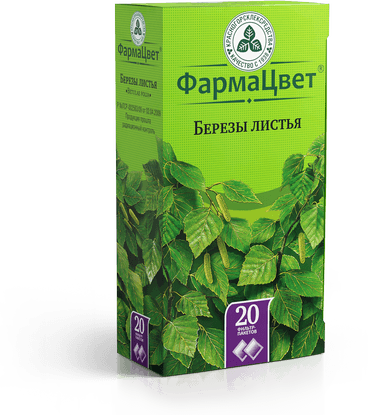Birch leaves (Betulae folia)
$5.00 inc. VAT
Overview
Birch is not just a beautiful tree, but a real treasure full of health-beneficial nutrients, a source of strength and health that has been used in traditional medicine practices for ages. No other tree is more significant in Russian culture than the esteemed birch. It is often called the “Lady of the woods” because it protects people from many ailments.
Medicine made from birch leaves finds many uses. And although the leaves are slightly inferior to birch buds in terms of their effects’ strength, many people prefer them for the very same reason, as buds contain a large amount of resinous substances that can be damaging to one’s health. But the effect of the leaves is more mild and hence they have fewer side effects and contraindications.
Although, in fact, it all depends on the goal of treatment, because the leaves and buds are used for different purposes.
Therapeutic Properties of Birch Leaves
Birch is known for its anti-inflammatory, antiseptic and antioxidant properties.
Due to its anti-inflammatory effect birch is used in alleviating pain (especially in patients with rheumatism), and due to its antibacterial property, it is also shown to be effective against uropathogenic Escherichia coli. As a result, it is used in treating minor urinary tract infections and as a diuretic.
It has antifungal, antiviral and antiparasitic properties as well.
Birch leaf is also known for its soothing effects on the skin, helping it heal, regenerate and get rid of any swelling, so it is often used in the treatment of many different skin disorders.
Moreover, birch is an expectorant that is used to treat coughing, and also has mild choleretic effect that is useful for patients with bile duct disorders. And the detoxifying abilities of birch leaves can help cleanse the blood.
Birch leaf extract also has general tonic and vitaminizing effect on the body.
Storage And Handling
Store birch leaves in the original package at a temperature under 25 ° C; store the boiled infusion in a cool place for no more than 2 days. Keep out of the reach of children!
Shelf life
3 years. Do not use after expiration date.
Manufacturer / Recipient Organization
JSC “Krasnogorskleksredstva”
Main Uses of Birch Leaves
- As a diuretic: treatment of swelling due to cardiovascular and renal disorders.
- As an anti-inflammatory agent: treatment of nephritis, nephrosis, inflammatory processes in kidneys and bladder, albuminuria, uric acid diathesis.
- As a mild choleretic: treatment of liver and biliary system disorders.
- As an analgesic: treatment of gout, rheumatism, arthritis, myositis, sciatica, arthrosis, pain in joints (used in form of infusion, compresses, lotions, applications);
- As an antiparasitic agent: treatment of helminth (parasitic worms) infestations & as an antiprotozoal agent: treatment of trichomoniasis and giardiasis (lambliasis).
Other uses
- Disrupted natural metabolism;
- Low level of vital energy, vitamin deficiency and weakened immune system (used as healing and tonic baths);
- Inflammatory diseases of the stomach: peptic ulcer or gastritis;
- Atherosclerosis and cardiovascular system disorders;
- Digestive disorders, including dysentery (as a mild astringent);
- Bronchitis, laryngitis, tracheitis and severe coughing (antiviral, expectorant, antibacterial, hemostatic effects);
- Skin disorders, including fungal, bacterial, parasitic, traumatic skin injuries, abscesses, dermatoses, psoriasis, lichenification, ulcers, scabies, eczema, furuncles, acne, rashes, burns (except for 4th degree burns), wounds, sores, irritation in skin folds and bedsores (used in the form of lotions, compresses, applications, wipings, baths);
- Hyperhidrosis (excessive sweating), unpleasant odor (used in form of hygienic baths or wipings with a cotton pad dipped in the infusion);
- Problems with hair-growth and brittle hair, dandruff (used in form rinsing infusion after hair-washing);
- Stomatitis, gingivitis, periodontal disease and toothaches (used in form lotions, applications, mouth-rinses);
- Glossitis, tonsillitis, pharyngitis and quinsy (used in form of mouth-rinsing);
- Sinusitis and runny nose (used in form of nose-rinsing);
- Cervical erosion, candidiasis and various gynecological inflammations (used in form of douching with the infusion);
- Hormonal disorders, menopause and menstrual cycle disorders (used in form of infusion).
Contraindications
- Hypersensitivity to any Birch component;
- Chronic renal failure;
- Acute glomerulonephritis and acute diseases of the urinary system;
- Gallstones or kidney stones;
- Pregnancy and breastfeeding period (consultation with a specialist is required);
- Children up to 12 years.
Side effects
- Possible allergic reactions (Birch pollen might cause allergies in people who have very sensitive skin or who are allergic to hazelnuts, peanuts, apples or soybeans).
- Prolonged usage may cause an exacerbation of kidney inflammatory diseases as a result of the renal parenchyma irritation.
Dosage and Brewing Instructions
Place 2 filter bags (3.0 g) in a glass or enamel bowl, pour 200 ml (1 glass) of boiling water over the bags, cover and let steep for 15 minutes, periodically pressing the teabags with a spoon, then squeeze the liquid out of them.
Heat up and drink 1/3-1/4 glass 3-4 times a day 30 minutes before meals. Shake the infusion up beforehand. The course of treatment lasts 2-4 weeks.
Repeat the course in 1-2 weeks only after consultation with a specialist.
If you are conducting diuretic therapy, be vigilant of the infusion dosage to avoid dehydration. DO NOT EXCEED DOSAGE.
If the symptoms worsen or persist without improvement for more than 1 week, consult a specialist.


Reviews
There are no reviews yet.